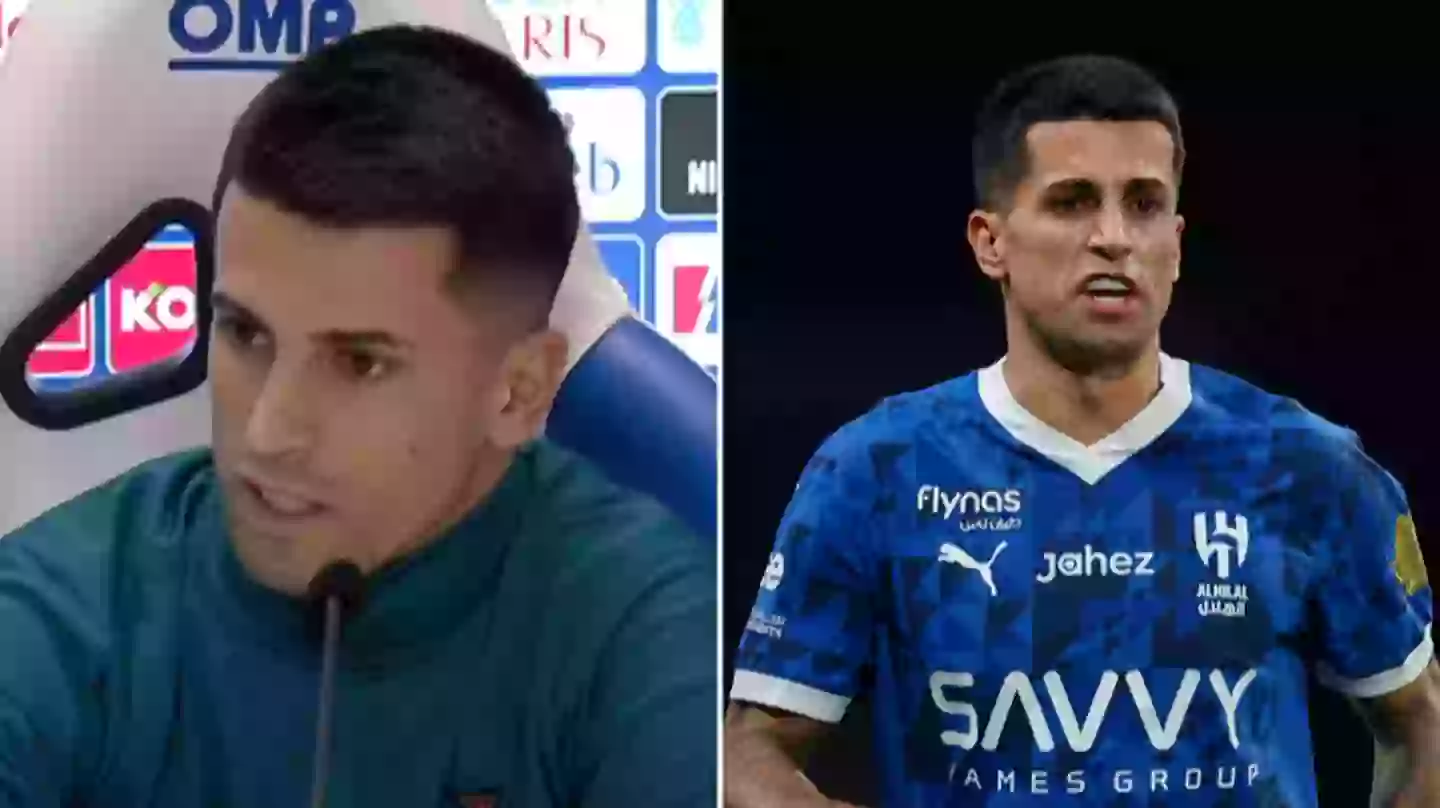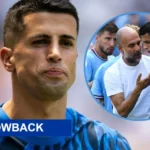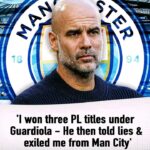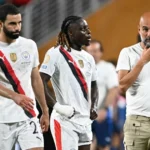Pep Guardiola and Joao Cancelo moment captured after Al-Hilal defeat as former Man City star cuts emotional figure

The humid Orlando evening air was thick with tension as Manchester City’s Club World Cup campaign came to a devastating end. In a match that will be remembered for its dramatic twists, defensive frailties, and emotional undertones, Al-Hilal emerged victorious with a 4-3 triumph after extra time, sending Pep Guardiola’s men home empty-handed. Yet perhaps the most compelling narrative to emerge from this heartbreaking defeat was not found in the scoreline, but in a tender moment of reconciliation between two figures whose relationship had been fractured by pride, ambition, and circumstance.
A Season’s Ambitions Crumble in Florida
Manchester City arrived in Orlando with genuine aspirations of adding another piece of silverware to their already impressive trophy cabinet. The Club World Cup represented more than just another competition for Pep Guardiola – it was an opportunity to cap off the 2024/25 season with a meaningful achievement and maintain the winning momentum that has defined his tenure at the Etihad Stadium.
The Citizens had navigated their way through the tournament with characteristic efficiency and flair. Their journey began with a commanding performance against Moroccan champions Wydad AC, followed by a professional dismantling of UAE representatives Al Ain. The quarterfinal victory over Italian giants Juventus had many believing that this could indeed be City’s tournament to lose. The tactical precision, individual brilliance, and collective understanding that had made them one of Europe’s most feared sides were all on full display.
However, football has a cruel way of humbling even the most confident of teams, and Al-Hilal proved to be the stumbling block that nobody had anticipated. The Saudi Arabian champions, bolstered by a mixture of experienced international stars and hungry local talent, arrived at the match with nothing to lose and everything to gain. Among their ranks stood Joao Cancelo, the Portuguese full-back whose departure from Manchester City had been shrouded in controversy and speculation.
The Cancelo Conundrum: A Relationship Tested
To understand the significance of the post-match embrace between Guardiola and Cancelo, one must first appreciate the complex dynamics that led to their separation. Joao Cancelo’s journey at Manchester City had begun with such promise. Arriving from Juventus in 2019, the versatile defender quickly established himself as one of the most innovative and effective full-backs in world football. His ability to seamlessly transition between defensive solidity and attacking creativity made him an integral component of Guardiola’s tactical system.
Under Guardiola’s tutelage, Cancelo evolved into something approaching footballing perfection in his position. His performances during City’s treble-winning campaign and subsequent seasons showcased a player who had fully embraced the Catalan coach’s philosophy. The Portuguese international’s understanding of positional play, his technical proficiency, and his willingness to take tactical risks made him a favorite among City supporters and a crucial element in the team’s success.
However, the 2022/23 season brought unexpected turbulence. Midway through what many expected to be another dominant campaign for City, Cancelo found himself increasingly marginalized. The emergence of alternative tactical setups and Guardiola’s experimentation with different defensive configurations meant that the Portuguese defender’s minutes began to dwindle. For a player of Cancelo’s caliber and ambition, this reduction in playing time was both unexpected and deeply frustrating.
The situation reached its breaking point in January 2023 when Cancelo made the difficult decision to join Bayern Munich on loan. The move represented more than just a temporary change of scenery – it was a statement of intent from a player who believed his talents deserved regular recognition at the highest level. The circumstances surrounding his departure were immediately scrutinized by media and fans alike, with many speculating about potential conflicts between player and manager.
Defensive Frailties Exposed
The match against Al-Hilal served as a harsh reminder of the defensive vulnerabilities that have occasionally plagued Manchester City throughout the season. Despite their attacking prowess and midfield dominance, City’s backline appeared surprisingly porous against their Saudi opponents. The defensive unit, which had been so reliable in previous campaigns, seemed to lack the cohesion and communication necessary to deal with Al-Hilal’s varied attacking threats.
Ederson, the Brazilian goalkeeper who has been such a reliable presence between the posts for City, endured one of his more challenging evenings. Several crucial saves were required, but there were moments when his positioning and decision-making came under scrutiny from disappointed City supporters. The defensive quartet in front of him fared little better, with gaps appearing in dangerous areas and communication breakdowns leading to scoring opportunities for the opposition.
The tactical battle was fascinating to observe. Al-Hilal, expertly coached and tactically astute, identified weaknesses in City’s defensive structure and exploited them with ruthless efficiency. Their ability to transition quickly from defense to attack, combined with their clinical finishing in crucial moments, exposed the kind of defensive fragility that Guardiola will undoubtedly address in his preparations for the upcoming 2025/26 season.
Joao Cancelo’s contribution to Al-Hilal’s victory cannot be understated. The Portuguese defender, playing against his former club for the first time since his brief appearance for Bayern Munich during his loan spell, delivered a performance that perfectly encapsulated his qualities as a player. His assist for one of Al-Hilal’s goals demonstrated the kind of creative threat from full-back positions that had made him so valuable during his time at City.
A Moment of Healing
The final whistle brought with it a mixture of emotions. For Manchester City players and supporters, there was the inevitable disappointment of seeing another trophy opportunity slip away. For Al-Hilal, there was the justified celebration of a famous victory against one of European football’s most successful clubs. Yet amid these contrasting emotions, the cameras captured something altogether more poignant and meaningful.
As players from both teams exchanged pleasantries and commiserations, Pep Guardiola made his way across the pitch toward Joao Cancelo. The embrace that followed was captured by multiple camera angles and would later circulate widely on social media platforms. It was a moment that spoke volumes about the character of both men and their ability to move beyond the professional disagreements that had characterized their separation.
The hug was not merely a polite gesture between former colleagues. It represented a genuine moment of reconciliation between two individuals who had shared significant success together and who harbored mutual respect despite their professional differences. Guardiola’s approach suggested a manager secure enough in his own position to acknowledge the contributions of a former player, while Cancelo’s receptive response indicated a player who had never lost respect for his former coach despite their disagreements.
For observers familiar with the circumstances of Cancelo’s departure, this moment carried particular significance. It served as visual confirmation that the professional relationship, while tested by different ambitions and expectations, had not been irreparably damaged by personal animosity. Both men had moved forward in their respective careers while maintaining the kind of mutual respect that speaks well of their character.
Emotional Complexity
Separate footage captured Cancelo in what appeared to be a highly emotional state following Al-Hilal’s victory. The Portuguese defender was visibly moved, potentially overwhelmed by the significance of delivering such an influential performance against his former club and in front of his former manager. These raw emotions provided a glimpse into the complex psychological dynamics at play for a player competing against a team where he had experienced both tremendous success and ultimate disappointment.
The emotional complexity of the situation was undeniable. Cancelo’s celebration was not one of vindictive triumph over former colleagues, but rather the natural expression of a professional athlete who had proven his worth on the biggest stage. His visible emotion suggested the deep personal investment he retained in demonstrating his continued value as a player, particularly in the context of his controversial departure from Manchester City.
This emotional response also highlighted the human element that often gets overlooked in professional football. Behind the tactical analyses, transfer negotiations, and media speculation are real people with genuine feelings, ambitions, and disappointments. Cancelo’s emotional state after the match served as a reminder that football, at its core, remains a deeply personal endeavor for those who participate at the highest level.
Guardiola’s Gracious Perspective
In the buildup to the match, Pep Guardiola had expressed genuine anticipation about facing Cancelo again. His comments suggested a manager who harbored no ill will toward his former player and who recognized the professional nature of their previous disagreement. This mature approach from Guardiola set the tone for the respectful interaction that would follow the final whistle.
The Catalan coach’s ability to separate personal relationships from professional decisions has been a hallmark of his managerial career. His willingness to embrace Cancelo after such a disappointing defeat demonstrated the kind of emotional intelligence and secure leadership that has made him one of the most respected figures in world football. Rather than allowing pride or disappointment to dictate his behavior, Guardiola chose to acknowledge both Cancelo’s performance and their shared history in a moment of genuine human connection.
This gesture also reflected Guardiola’s understanding of the broader dynamics at play. His decision to seek out Cancelo for an embrace sent a powerful message about forgiveness, professional respect, and the ability to move beyond disagreements. For younger players watching, it provided an example of how to handle difficult situations with grace and maturity.
Setting the Record Straight
The post-match reconciliation gains additional significance when considered alongside Cancelo’s previous statements about his departure from Manchester City. In March 2024, the Portuguese defender had addressed rumors of a significant falling-out with Guardiola, providing his own perspective on the circumstances that led to his exit.
“A competitive player, like me, who aspires to win titles, just wants to play,” Cancelo had explained in an interview with TNT Sports. “It’s not a question of devaluing my teammates. But I thought I deserved to play and he didn’t. So we talked, it was a conversation, not a discussion, and we decided that the best thing would be for me to leave this market.”
These comments painted a picture of professional disagreement rather than personal animosity. Cancelo’s characterization of their discussions as “a conversation, not a discussion” suggested a mature handling of a difficult situation by both parties. His emphasis on mutual agreement and his acknowledgment of his own “difficult personality” demonstrated self-awareness and honesty about his role in the situation.
“An opportunity I couldn’t refuse. It was by mutual agreement,” Cancelo had continued. “If City didn’t want to, they wouldn’t let me leave, because I had a contract. I’m very professional, I’ve always given my face for all the clubs. I have a difficult personality, yes, but I have never, at any time, disrespected teammates or coaches.”
These statements provide crucial context for understanding the embrace between Guardiola and Cancelo. Rather than representing a healing of deep personal wounds, the moment perhaps reflected the natural evolution of a professional relationship that had been handled with maturity and respect from the beginning.
The Saudi Arabian Chapter
Cancelo’s move to Al-Hilal in the summer of 2024 represented another significant chapter in his career journey. The Saudi Pro League, with its ambitious recruitment strategy and significant financial investment, had become an increasingly attractive destination for established European players seeking new challenges and opportunities.
Since joining Al-Hilal, Cancelo has continued to demonstrate the qualities that made him such a valuable player at Manchester City. His 38 appearances for the Saudi club, along with his two goals and twelve assists, reflect a player who has successfully adapted to a new environment while maintaining his high performance standards. His contribution to Al-Hilal’s victory over City, including his assist, served as a reminder of his continued relevance at the highest level of football.
The Portuguese defender’s success in Saudi Arabia also validates his decision to leave Manchester City in search of regular playing time. Rather than accepting a reduced role or allowing his career to stagnate, Cancelo chose to embrace a new challenge and has clearly thrived in his new environment. His performance against his former club demonstrated that his ambitions and self-belief had been justified.
Implications for Manchester City
Beyond the immediate disappointment of elimination from the Club World Cup, the defeat to Al-Hilal and the performance of Joao Cancelo raise important questions for Manchester City’s future planning. The defensive vulnerabilities exposed during the match will undoubtedly feature prominently in Guardiola’s preparations for the 2025/26 season.
The sight of a former City player contributing significantly to their elimination serves as a reminder of the importance of squad depth and the potential consequences of allowing talented players to leave. While Cancelo’s departure may have been necessary given the circumstances, his continued high-level performance raises questions about whether alternative solutions could have been found.
For City’s current squad, the defeat provides valuable lessons about complacency and the importance of maintaining defensive discipline against opponents who may be perceived as inferior. The Club World Cup elimination serves as a humbling reminder that in football, reputation and past success guarantee nothing in individual matches.
A Lesson in Professional Maturity
The embrace between Pep Guardiola and Joao Cancelo transcends the immediate context of a football match result. It represents a masterclass in professional maturity, demonstrating how disagreements and difficult decisions can be handled with respect and dignity. Both men emerged from the interaction with their reputations enhanced, having shown that success and failure, agreement and disagreement, need not preclude mutual respect.
For the broader football community, this moment provides a positive example of how relationships can evolve and heal over time. In an era where social media often amplifies conflicts and creates permanent records of disagreements, the ability of Guardiola and Cancelo to move beyond their professional differences offers hope for more constructive discourse in football.
The incident also highlights the complex emotional dynamics that exist in professional football. Players and managers form genuine relationships that extend beyond tactical considerations and contractual obligations. When these relationships are tested by professional decisions, the outcome depends largely on the maturity and character of the individuals involved.
Looking Forward
As Manchester City returns from Orlando to prepare for the upcoming season, the lessons learned from their Club World Cup elimination will undoubtedly influence their approach to squad development and tactical preparation. The defensive issues exposed against Al-Hilal will require attention, while the overall experience serves as motivation for future competitions.
For Joao Cancelo, the victory over his former club represents both personal vindication and professional achievement. His successful adaptation to life in Saudi Arabia and his continued performance at the highest level demonstrate the wisdom of his decision to prioritize playing time over other considerations.
The embrace between Guardiola and Cancelo will be remembered as one of the most significant non-sporting moments of the Club World Cup. It serves as a reminder that football, despite its competitive intensity and commercial pressures, remains fundamentally about human relationships and mutual respect.
Conclusion
The story of Manchester City’s defeat to Al-Hilal extends far beyond the 90 minutes of football played in Orlando. It encompasses themes of ambition, disappointment, reconciliation, and professional growth. The central narrative of Joao Cancelo’s performance against his former club and his subsequent embrace with Pep Guardiola provides a compelling human element to what might otherwise be remembered as just another cup elimination.
In an age where football discourse is often dominated by controversy and conflict, the mature handling of a complex professional relationship by both Guardiola and Cancelo offers a refreshing alternative narrative. Their ability to move beyond disagreement toward mutual respect provides a template for how similar situations might be handled in the future.
As both men continue their respective journeys in football, this moment in Orlando will likely be remembered as a positive chapter in their shared story. It demonstrates that success in football is not just measured in trophies and victories, but also in the relationships formed and the character displayed in both triumph and defeat.
The Club World Cup may have ended in disappointment for Manchester City, but the reconciliation between Guardiola and Cancelo provides a silver lining that transcends the immediate sporting context. It serves as a reminder that in football, as in life, the most meaningful victories are often found in moments of human connection and mutual understanding.















